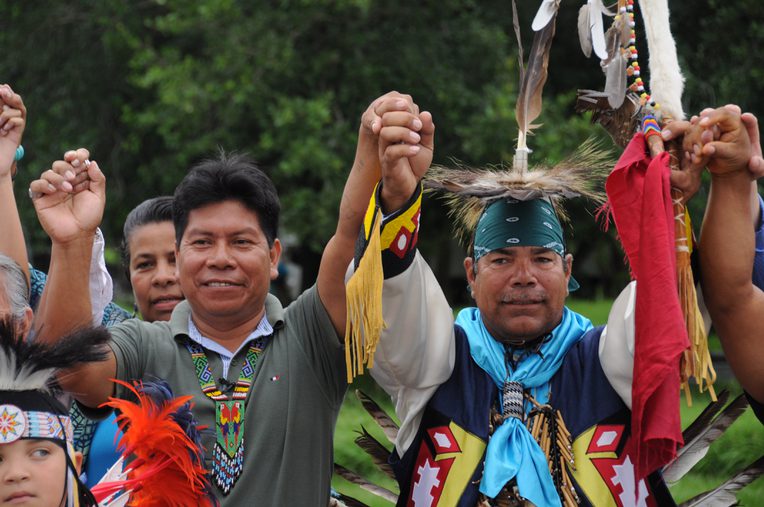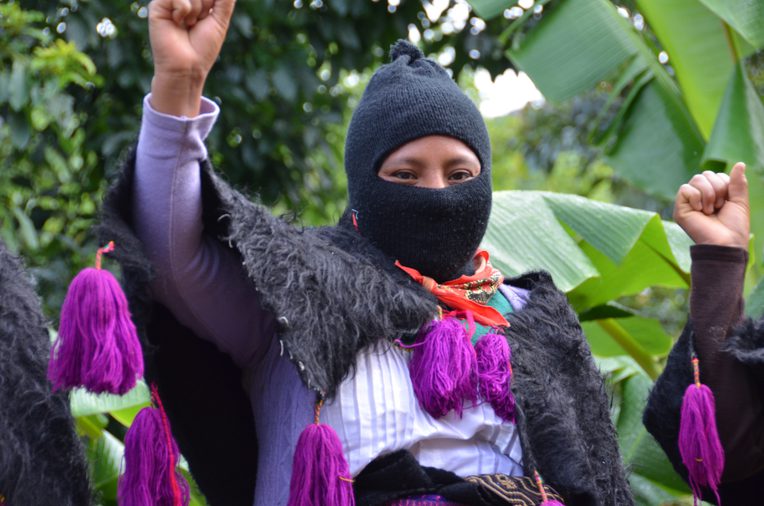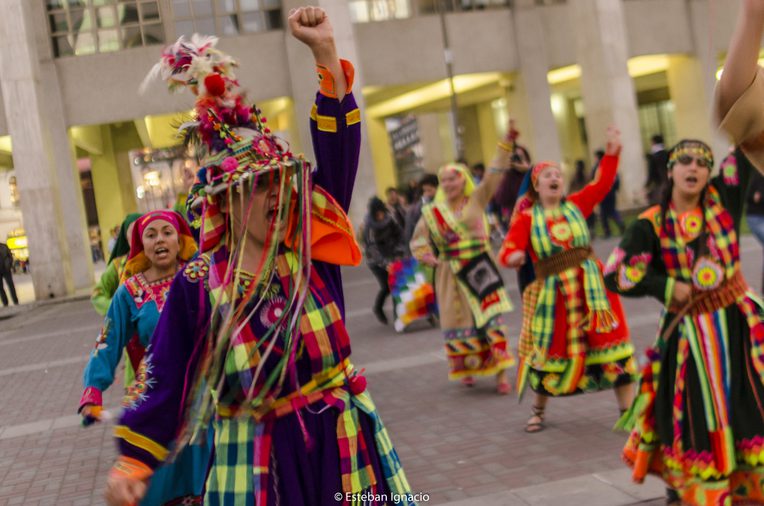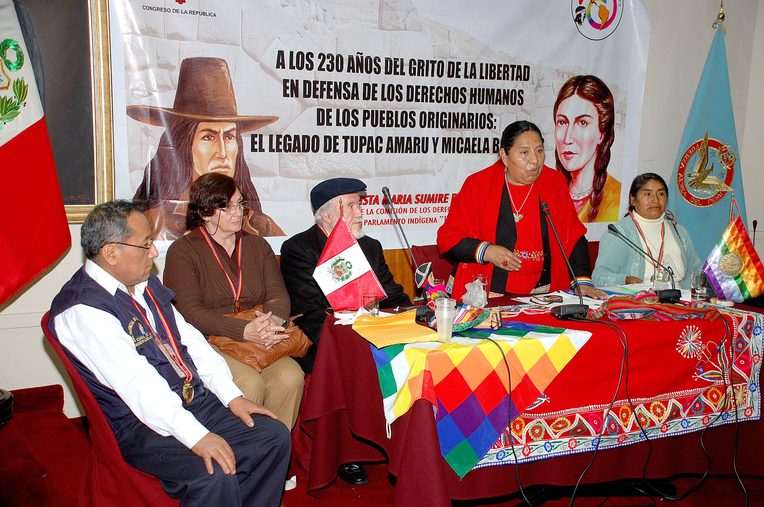Overview
Latin America is an extensive region which comprises a vast number of countries, each with distinct cultures, flavors, and stories. However, Latin American countries all share a political past that includes colonialism, a string of dictatorships, strong links with communism, and a complex power dynamic with both the United States and the major European powers. All of this shapes contemporary politics in Latin America, including the development of indigenous movements and the struggle for identity, land rights, and political voice. At this moment in time, when Latin America is witnessing a rebirth of leftist politics which co-exist with maintained neoliberal economic development policies, indigenous movements are once more responding to social, political, and economical change. It is therefore necessary to study these movements historically, as well as in relation to the wider current political scene of the region and beyond. Questions we need to bear in mind are: how do indigenous movements relate to the local political scene? How do they relate to other social movements on a global scale? How are indigenous politics shaped by culture and cosmologies (de la Cadena 2010)? Finally, how does social movements theory fall short when analyzing non-western movements (Veber 1998), and what is the role of the anthropologist in “activist research”? (Hale 2006). This teaching tools page provides lecturers with a set of activities, audiovisual materials, and reading list that looks at a range of indigenous movements individually, but also in relation the wider social and political context of Latin America as a whole.
Learning Outcomes
After this lesson students should:
- Have a good understanding of the particularities of indigenous movements
- Be aware of a range of indigenous movements in Latin America
- Have a good understanding of one or more indigenous movements and understand them within the current local and global sociopolitical contexts
- Gain understanding of concepts in social movements theory
Audience
- Undergraduate students in Anthropology, Sociology, Political Science, and Latin American Studies
- Faculty teaching seminars on social movements and indigenous politics
Readings
Books
Cervone, Emma. Long Live Atahualpa: Indigenous Politics, Justice, and Democracy in the Northern Andes. Durham: Duke University Press Books, 2012
Galeano, Eduardo. Open Veins of Latin America: Five Centuries of the Pillage of a Continent, Translated by Cedric Belfrage. New York: Monthly Review Press, 2007
Lange, Erick D. and Munoz, Elena. Contemporary Indigenous Movements in Latin America (Jaguar Books on Latin America).Lanham, Maryland: Rowman & Littlefield Publishers, 2003
Menchu, Rigobert. I, Rigoberta Menchu: An Indian Woman in Guatemala. London: Verso, 1984
Rice, Roberta. The New Politics of Protest: Indigenous Mobilization in Latin America’s Neoliberal Era. Tucson: University of Arizona Press, 2012
Warren, Kay B. Indigenous Movements and their Critics: Pan-Maya Activism in Guatemala. New Jersey: Princeton University Press, 1998
Warren, Kay B. and Jackson Jean E. Indigenous Movements, Self Representation, and the State in Latin America. Austin: University of Texas Press, 2003
Khasnabish, Alex. Zapatistas: Rebellion from the Grassroots to the Global. New York: Zed Books, 2010
Womack, John Jr. Rebellion in Chiapas: An Historical Reader. New York: The New Press, 1999
Maeckelbergh, Marianne. The Will of the Many: How the Alterglobalisation Movement is Changing the Face of Democracy. London: Pluto Press, 2009
Yashar, Deborah J. Contesting Citizenship in Latin America: The Rise of Indigenous Movements and the Postliberal Challenge (Cambridge Studies in Contentious Politics) Cambridge: Cambridge University Press, 2005
Journal Articles
Hale, Charles R. “Activist Research v. Cultural Critique: Indigenous Land Rights and the Contradictions of Politically Engaged Anthropology”. Cultural Anthropology 21.1(2006): 96 - 120
Jackson, Jean E. And Warren, Kay B. “Indigenous Movements in Latin America, 1992-2004: Controversies, Ironies, New Directions”Annual Review of Anthropology 34(2005): 549-573
De la Peña, Guillermo. “Social and Cultural Policies toward Indigenous Peoples: Perspectives from Latin America” Annual Review of Anthropology , Vol. 34, (2005), pp. 717-739
Stocks, Anthony. “Too Much for Too Few: Problems of Indigenous Land Rights in Latin America” Annual Review of Anthropology 34 (2005): 85-104
Veber, Hanne. “The Salt of the Montaña: Interpreting Indigenous Activism in the Rain Forest”Cultural Anthropology 13.3 (1998): 382 - 413
De la Cadena, Marisol. “Indigenous Cosmopolitics in the Andes: Conceptual Reflections beyond "Politics"” Cultural Anthropology 25.2 (2010): 334 - 370 Supplemental material
Rockefeller, Stuart Alexander. “Dual Power In Bolivia: Movement And Government Since The Election Of 2005” Urban Anthropology and Studies of Cultural Systems and World Economic Development 36. 3: Power, Indigeneity, Economic Development and Politics in Contemporary Bolivia (2007): 161-193
Guftanson, Bret. “Manipulating Cartographies: Plurinationalism, Autonomy, and Indigenous Resurgence in Bolivia” Anthropological Quarterly 82.4 (2009): 985-1016
Colloredo-Mansfeld, Rudi “The Power of Ecuador's Indigenous Communities in an Era of Cultural Pluralism” Social Analysis 51.2: Indigenous Peoples, Civil Society, and the Neo-liberal State in America (2007): 86-106
Henck, Nick. “Laying a Ghost to Rest: Subcommander Marcos' Playing of the Indigenous Card” Mexican Studies/Estudios Mexicanos 25.1 (2009):155-170
Nash, June. “The Fiesta of the Word: The Zapatista Uprising and Radical Democracy in Mexico” American Anthropologist, New Series, 99.2(1997): 261-274
Mora, Mariana. “Zapatista Anticapitalist Politics and the "Other Campaign": Learning from the Struggle for Indigenous Rights and Autonomy” Latin American Perspectives 34.2: Globalizing Resistance: The New Politics of Social Movements in Latin America (2007): 64-77
Van der Haar, Gemma. “The Zapatista Uprising and the Struggle for Indigenous Autonomy” European Review of Latin American and Caribbean Studies / Revista Europea de Estudios Latinoamericanos y del Caribe 76 (2004): 99-108
Higgins, Nicholas. “The Zapatista Uprising and the Poetics of Cultural Resistance” Alternatives: Global, Local, Political 25.3: Poetic World Politics (2000): 359-374
Hernández Castillo, Rosalva Aída and Furio, Victoria J. “The Indigenous Movement in Mexico: Between Electoral Politics and Local Resistance” Latin American Perspectives 33.2: The Mexican Presidency, 2006-2012: Neoliberalism, Social Movements, and Electoral Politics (2006): 115-131
Richards, Patricia “The Politics of Gender, Human Rights, and Being Indigenous in Chile” Gender and Society 19.2: Gender-Sexuality-State-Nation: Transnational Feminist Analysis (2005): 199-220
Rodriguez, Patricia and Carruthers, David. “Testing Democracy's Promise: Indigenous Mobilization and the Chilean State” European Review of Latin American and Caribbean Studies / Revista Europea de Estudios Latinoamericanos y del Caribe 85 (2008): 3-21
Articles/Essays
“Zapatistas can still change the rules of Mexico’s Politics” by Luis Hernandez Navarro. The Guardian Online, 2012.
“The Weakest Link? Neoliberalism in Latin America” by Emir Sader, New Left Review 52, 2008
“Ecuador: Correa, the Indigenous Movements and the Left” by Paul Gottinger, Latin American Bureau, 2012
Pre-class Assignments
- Read selected literature on indigenous movements in Latin America (to be determined by course leader)
- Read one selected article on the anthropological study of indigenous movements (choose between Veber 1998 and Hale 2006)
- Read and be prepared to discuss selected literature on the Zapatista Army of National Liberation (choose 2 or 3 articles and/or book chapters)
Opening Activity
Discuss: how would you define indigenous movements? List main concepts associated with this social phenomenon. Are indigenous movements different from other social movements? In what ways?
Discussion Questions
- What traits are common to most indigenous movements in Latin America?
- What problems arise when considering all indigenous movements in Latin America under the same umbrella?
- What factors do you think condition the nature of indigenous movements in different countries of the region? Make reference to demographics, political context, history, and culture.
- How do contemporary indigenous movements relate to global movements such as environmentalism and alterglobalization?
In-class Activities
Case study: Zapatistas
- Watch suggested videos (see below)
- Considering the provided writings and audiovisual material on the Zapatista Army of National Liberation, discuss:
- Is Zapatismo an indigenous movement? How does it relate to the history of indigenous land struggles in Mexico?
- What is the structure and organization of the Zapatista movement?
- What sort of tactics do they resort to as forms of protest? How do they make use of the media (both mainstream and independent)?
- How are ritual and symbolism incorporated into their protest practices?
- How does the Zapatista movement relate to other social struggles across the globe?
- How does it fit within a larger alterglobalization or global justice movement?
Discuss in small groups:
- What are the links between indigenous movements and environmentalism? Refer to common claims across movements in Latin America, the relationship with international organizations, and the role of nature and the environment in culture and beliefs.
Images



